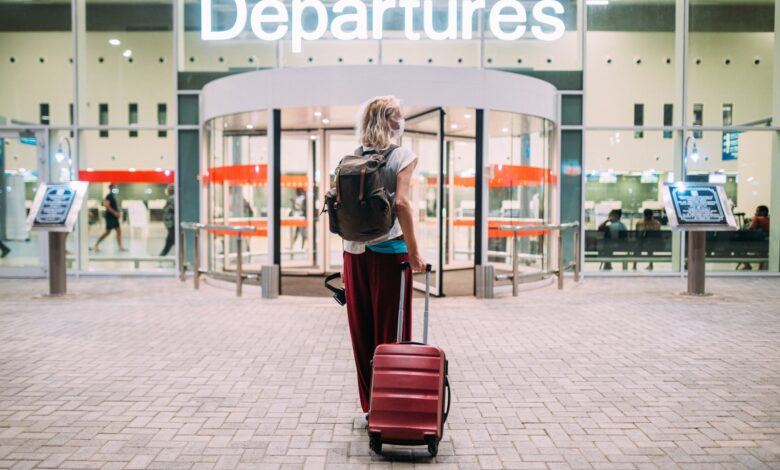Carry-on vs. checked bags: Which is the better choice?

It’s often a flyer’s greatest dilemma: Do you opt for carry-on or checked bags?
Some frequent travelers are staunch advocates of only traveling with a carry-on bag. Others don’t want the hassle and prefer to check a bag. Some flyers make the call on a flight-by-flight basis; a short business trip could require only a carry-on, while a two-week Europe cruise might necessitate a checked bag.
If you don’t fall firmly in the Team Carry-on or Team Checked Luggage camps, consider the following reasons why you might choose a carry-on versus a checked bag on your next flight.
Airline baggage fees
If you’re looking to save money, carry-on bags are the better bet because most airlines allow you one free carry-on bag and one free personal item. At the same time, most airlines will charge a checked bag fee, typically starting at $30 or $35 for the first checked bag on a domestic flight, with prices increasing for additional bags.
However, you shouldn’t generalize about bag fees when you’re deciding whether to check your suitcase or carry it on. Low-cost airlines, such as Spirit and Frontier, do levy charges for carry-on bags. Book a basic economy ticket on United Airlines, and you’ll also have to pay for your rollaboard.
On the flip side, you might be eligible for free checked bags if you have elite status on the airline you’re flying or have a cobranded airline credit card. Depending on your particular status, you might also get free bags for some or all of your travel companions. In addition, some premium seats, such as business or first class, come with one or two free checked bags.
Hassle-free travel
Both checking and carrying on your luggage can offer hassle-free travel, depending on which situations irk you more.
If you’re in a rush or hate waiting in lines or at the baggage carousel, you’ll want to carry on your luggage. When you arrive at your departure airport, you won’t have to queue up to check your bag, and when you arrive at your final destination, you can walk right off the plane and out to transportation — without spending eons at the baggage carousel waiting for your suitcase to appear.
But, if you’d rather stroll through the airport unencumbered by a suitcase, check that bag. You’ll be able to navigate through the terminal, maneuver in small bathroom stalls or squeeze into an airport restaurant booth without the burden of a rollaboard. Carrying fewer items will also give you more space to stretch out once you’re on board the airplane.

Daily Newsletter
Reward your inbox with the TPG Daily newsletter
Join over 700,000 readers for breaking news, in-depth guides and exclusive deals from TPG’s experts
Risk of loss or damage
Lost luggage is a major buzzkill on any trip. My husband had to go to a job interview in jeans and buy new clothes for our rehearsal dinner because the airline lost his bags. I’ve seen bereft travelers on cruise ships apologetically sneaking into a sit-down dinner in their travel clothes because their suitcase went missing.
If you want to avoid lost luggage at all costs, you’ll want to carry on a bag. Once your suitcase is out of your possession, it’s out of your control whether you see it again … or not.
Also, as the viral “United Breaks Guitars” music video proved, baggage handlers are not always as careful with your belongings as you’d like. Suitcases, car seats and sports and music equipment can get rough-handled and damaged on their way to and from the airline’s hold. Aim for carry-ons, when possible, if you’re worried about the airline damaging your luggage.
What you need to pack
You can’t carry on a large suitcase even if you want to, so sometimes the amount of stuff you plan to take on a trip makes the carry-on versus checked-bag decision for you. If you’re going on a two-day business trip, for example, it’s unlikely you’ll need more than a small rollaboard and a laptop bag. Checking a bag would seem like overkill.
However, if you’re going on a two-week expedition to Antarctica and need a bunch of cold-weather gear, you might find it impossible to fit everything you need in a carry-on. Checking a bag might be inevitable.
I nearly always check a bag because I can’t fit all my liquids in a tiny quart-size bag. If you need to travel with full-size or multiple bottles of toiletries and makeup, you’ll be forced to check your suitcase. Similarly, if you’re flying with bulky sports equipment or other items you can’t bring on board, prepare yourself to pay those checked bag fees.
Avid shoppers should also be prepared to check a bag, at least on the way home, to accommodate all those cool souvenirs.
Related: 7 items you should always pack in your carry-on bag
Onboard space
Don’t forget to consider onboard space, both for you and your bags, when making the decision to check or carry on your luggage.
If you don’t have elite status, the right credit card or an early boarding group on a sold-out flight, chances are you’ll have to gate-check your rollaboard whether you want to or not. Anxious types might want to eliminate the stress of waiting until you board to see if there will still be overhead space for your bags by checking the suitcase in the first place. It’s definitely frustrating when you strategically pack everything into a smaller bag and still have to give it up.
Also, consider how much personal space you need on your flight, especially if you’re traveling in a cramped coach seat. Short folks might not mind a bag at their feet; taller travelers, whose knees already hit the seatback in front of them, might benefit from extra floor space.
Of course, travelers in business- and first-class seats will be able to carry on larger bags with less trouble, both because there are fewer passengers vying for the overhead space and also because there’s simply more room for luggage and feet.
Other considerations
Travelers with physical limitations might find it easier to check a bag if it’s difficult to navigate long airport walkways dragging a suitcase or if it’s less awkward to carry just a backpack when you’re being escorted in a wheelchair.
In the same vein, families flying with kids might want to check their bags if they’re already pushing strollers and carrying babies around the airport. Also, if you plan to check a car seat or stroller (versus carrying on or gate-checking the baby gear), you need to stand in the bag check line anyway, so you’re not saving any time by not checking your suitcase.
On the other hand, travelers hoping to fly standby will be better off keeping all their luggage on their person so they don’t end up on a flight departing hours earlier than their suitcase. On international flights, you might not be allowed to fly standby if you have checked bags.
Bottom line
It’s a personal decision whether you need or want to carry on or check your luggage for any trip. But if you need a rule of thumb to go by, here’s how we fall on the carry-on versus checked-bag debate.
Carry your bags on board for short trips, when you want to spend as little time as possible getting in and out of airports, and when avoiding checked bag fees is key.
Check your bags when you need the extra space in your suitcase or around you on the plane, if you can check your suitcase for free and when the hassle of dragging a rollaboard through the airport is just too much.
Related reading:




